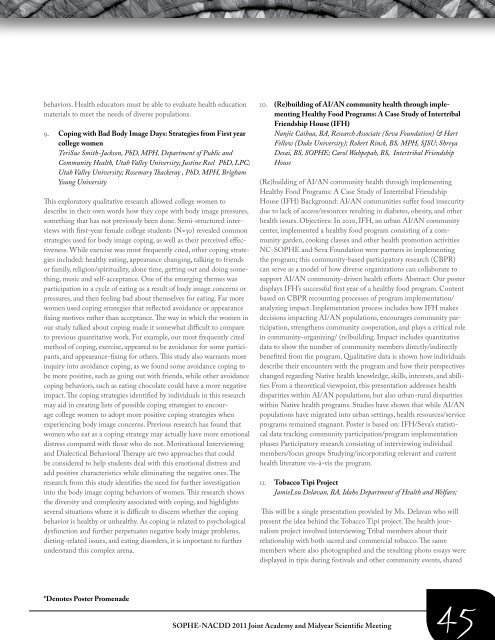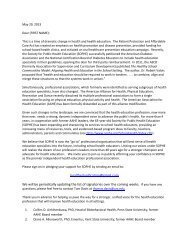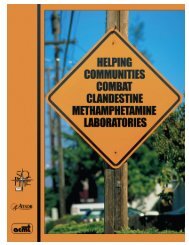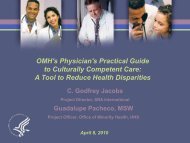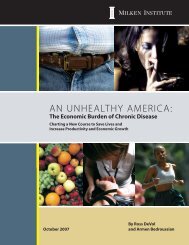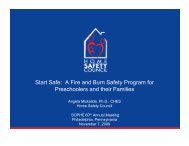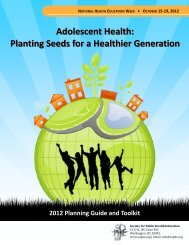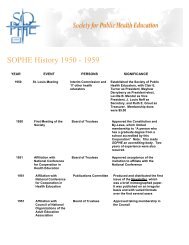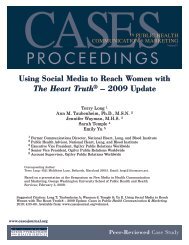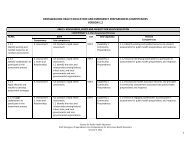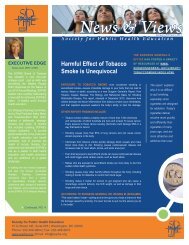to view the program - Society for Public Health Education
to view the program - Society for Public Health Education
to view the program - Society for Public Health Education
You also want an ePaper? Increase the reach of your titles
YUMPU automatically turns print PDFs into web optimized ePapers that Google loves.
ehaviors. <strong>Health</strong> educa<strong>to</strong>rs must be able <strong>to</strong> evaluate health education<br />
materials <strong>to</strong> meet <strong>the</strong> needs of diverse populations.<br />
9. Coping with Bad Body Image Days: Strategies from First year<br />
college women<br />
TeriSue Smith-Jackson, PhD, MPH, Department of <strong>Public</strong> and<br />
Community <strong>Health</strong>, Utah Valley University; Justine Reel PhD, LPC;<br />
Utah Valley University; Rosemary Thackeray , PhD, MPH, Brigham<br />
Young University<br />
This explora<strong>to</strong>ry qualitative research allowed college women <strong>to</strong><br />
describe in <strong>the</strong>ir own words how <strong>the</strong>y cope with body image pressures,<br />
something that has not previously been done. Semi-structured inter<strong>view</strong>s<br />
with first-year female college students (N=30) revealed common<br />
strategies used <strong>for</strong> body image coping, as well as <strong>the</strong>ir perceived effectiveness.<br />
While exercise was most frequently cited, o<strong>the</strong>r coping strategies<br />
included: healthy eating, appearance changing, talking <strong>to</strong> friends<br />
or family, religion/spirituality, alone time, getting out and doing something,<br />
music and self-acceptance. One of <strong>the</strong> emerging <strong>the</strong>mes was<br />
participation in a cycle of eating as a result of body image concerns or<br />
pressures, and <strong>the</strong>n feeling bad about <strong>the</strong>mselves <strong>for</strong> eating. Far more<br />
women used coping strategies that reflected avoidance or appearance<br />
fixing motives ra<strong>the</strong>r than acceptance. The way in which <strong>the</strong> women in<br />
our study talked about coping made it somewhat difficult <strong>to</strong> compare<br />
<strong>to</strong> previous quantitative work. For example, our most frequently cited<br />
method of coping, exercise, appeared <strong>to</strong> be avoidance <strong>for</strong> some participants,<br />
and appearance-fixing <strong>for</strong> o<strong>the</strong>rs. This study also warrants more<br />
inquiry in<strong>to</strong> avoidance coping, as we found some avoidance coping <strong>to</strong><br />
be more positive, such as going out with friends, while o<strong>the</strong>r avoidance<br />
coping behaviors, such as eating chocolate could have a more negative<br />
impact. The coping strategies identified by individuals in this research<br />
may aid in creating lists of possible coping strategies <strong>to</strong> encourage<br />
college women <strong>to</strong> adopt more positive coping strategies when<br />
experiencing body image concerns. Previous research has found that<br />
women who eat as a coping strategy may actually have more emotional<br />
distress compared with those who do not. Motivational Inter<strong>view</strong>ing<br />
and Dialectical Behavioral Therapy are two approaches that could<br />
be considered <strong>to</strong> help students deal with this emotional distress and<br />
add positive characteristics while eliminating <strong>the</strong> negative ones. The<br />
research from this study identifies <strong>the</strong> need <strong>for</strong> fur<strong>the</strong>r investigation<br />
in<strong>to</strong> <strong>the</strong> body image coping behaviors of women. This research shows<br />
<strong>the</strong> diversity and complexity associated with coping, and highlights<br />
several situations where it is difficult <strong>to</strong> discern whe<strong>the</strong>r <strong>the</strong> coping<br />
behavior is healthy or unhealthy. As coping is related <strong>to</strong> psychological<br />
dysfunction and fur<strong>the</strong>r perpetuates negative body image problems,<br />
dieting-related issues, and eating disorders, it is important <strong>to</strong> fur<strong>the</strong>r<br />
understand this complex arena.<br />
10. (Re)building of AI/AN community health through implementing<br />
<strong>Health</strong>y Food Programs: A Case Study of Intertribal<br />
Friendship House (IFH)<br />
Nanjie Caihua, BA, Research Associate (Seva Foundation) & Hart<br />
Fellow (Duke University); Robert Rinck, BS, MPH, SJSU; Shreya<br />
Desai, BS, SOPHE; Carol Wahpepah, BS, Intertribal Friendship<br />
House<br />
(Re)building of AI/AN community health through implementing<br />
<strong>Health</strong>y Food Programs: A Case Study of Intertribal Friendship<br />
House (IFH) Background: AI/AN communities suffer food insecurity<br />
due <strong>to</strong> lack of access/resources resulting in diabetes, obesity, and o<strong>the</strong>r<br />
health issues. Objectives: In 2010, IFH, an urban AI/AN community<br />
center, implemented a healthy food <strong>program</strong> consisting of a community<br />
garden, cooking classes and o<strong>the</strong>r health promotion activities<br />
NC-SOPHE and Seva Foundation were partners in implementing<br />
<strong>the</strong> <strong>program</strong>; this community-based participa<strong>to</strong>ry research (CBPR)<br />
can serve as a model of how diverse organizations can collaborate <strong>to</strong><br />
support AI/AN community-driven health ef<strong>for</strong>ts Abstract: Our poster<br />
displays IFH’s successful first year of a healthy food <strong>program</strong>. Content<br />
based on CBPR recounting processes of <strong>program</strong> implementation/<br />
analyzing impact. Implementation process includes how IFH makes<br />
decisions impacting AI/AN populations, encourages community participation,<br />
streng<strong>the</strong>ns community cooperation, and plays a critical role<br />
in community-organizing/ (re)building. Impact includes quantitative<br />
data <strong>to</strong> show <strong>the</strong> number of community members directly/indirectly<br />
benefited from <strong>the</strong> <strong>program</strong>. Qualitative data is shown how individuals<br />
describe <strong>the</strong>ir encounters with <strong>the</strong> <strong>program</strong> and how <strong>the</strong>ir perspectives<br />
changed regarding Native health knowledge, skills, interests, and abilities<br />
From a <strong>the</strong>oretical <strong>view</strong>point, this presentation addresses health<br />
disparities within AI/AN populations, but also urban-rural disparities<br />
within Native health <strong>program</strong>s. Studies have shown that while AI/AN<br />
populations have migrated in<strong>to</strong> urban settings, health resources/service<br />
<strong>program</strong>s remained stagnant. Poster is based on: IFH/Seva’s statistical<br />
data tracking community participation/<strong>program</strong> implementation<br />
phases Participa<strong>to</strong>ry research consisting of inter<strong>view</strong>ing individual<br />
members/focus groups Studying/incorporating relevant and current<br />
health literature vis-à-vis <strong>the</strong> <strong>program</strong>.<br />
11. Tobacco Tipi Project<br />
JamieLou Delavan, BA, Idaho Department of <strong>Health</strong> and Welfare;<br />
This will be a single presentation provided by Ms. Delavan who will<br />
present <strong>the</strong> idea behind <strong>the</strong> Tobacco Tipi project. The health journalism<br />
project involved inter<strong>view</strong>ing Tribal members about <strong>the</strong>ir<br />
relationship with both sacred and commercial <strong>to</strong>bacco. The same<br />
members where also pho<strong>to</strong>graphed and <strong>the</strong> resulting pho<strong>to</strong> essays were<br />
displayed in tipis during festivals and o<strong>the</strong>r community events, shared<br />
*Denotes Poster Promenade<br />
SOPHE-NACDD 2011 Joint Academy and Midyear Scientific Meeting 45


